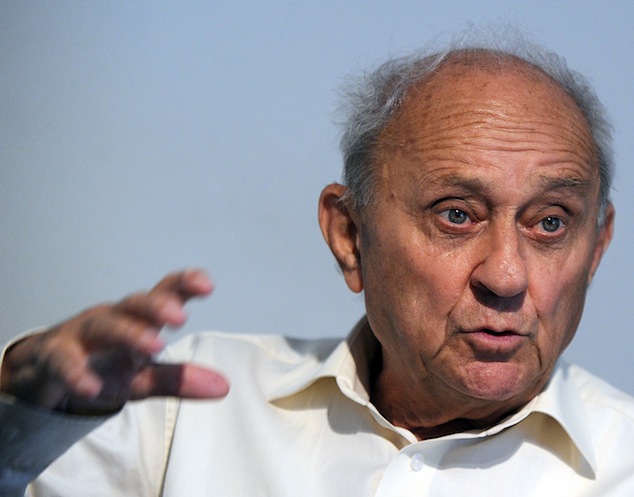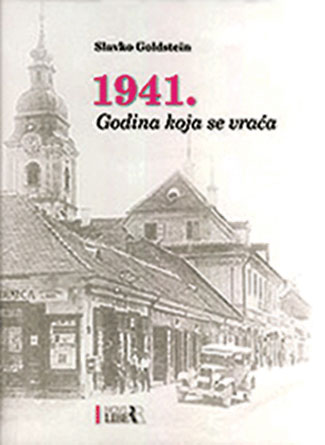Book Interview: “1941: The Year That Keeps Returning” — Doubt is not a Fatal Weakness
Through meticulous research, interviews, and reminiscence, this compelling book illuminates a nook in the heart of darkness.
By Bill Marx
You could subtitle this unusual and revelatory amalgamation of history and memoir “a year in the life of the Holocaust in Croatia.” On April 13, 1941 Slavko Goldstein was thirteen years old. By the end of day, his father, an owner of a bookstore in Karolvac, had been arrested with a number of others by the Ustasha, the pro-fascist nationalists who had just come to power, aided and abetted by the Nazis. The latter eventually became alarmed by the unbridled ferocity and bloodthirstiness of the Ustasha, which initiated a reign of terror and death on Jews, Gypsies, and Serbs. Sixty-five years after the death of his father in a death camp at the hands of the Ustasha, Goldstein, a respected journalist and publisher, received a letter his father had written to him from prison. That poignant voice from the past triggered the writing of 1941: The Year That Keeps Returning (New York Review Books Original, 622 pages, $35), translated from the Croatian by Michael Gable.
Through meticulous research, interviews, and reminiscence, the book illuminates a nook in the heart of darkness: from 1941 through 1945 approximately 32,000 Jews, 40,000 Gypsies, and 350,000 Serbs were killed in Croatia. Goldstein, who earned a number of Croatian literary awards for the volume when it was published in 2007, grapples with a succession of mysteries: he explores how fascism took control, delineates the machinery of political oppression and the impulses toward resistance, investigates murders large and small and determines responsibility, jumps into the future to detail the fates of the victims and their victimizers, and draws conclusions about the particular nature of the evil that was unleashed. On a personal level, Goldstein speculates about why his father wrote the letter and explores how and why it survived, and also includes material about how his family made it through such perilous times. As if this wasn’t enough, 1941: The Year That Keeps Returning keeps a sharp eye on what the barbarity then has to say about recent Croat-Serb antagonism. His conclusion is that a hard-bitten skepticism may be the most effective weapon we have against the collective insanity fostered by runaway ideals.
The twentieth century produced the greatest hopes for mankind, but it buried most of them. It became the graveyard for great ideals. It taught us that ideals are most often a seductive chimera and that doubt is not a fatal weakness but a necessary defense against fatal beliefs.
I sent off some questions via e-mail to Goldstein about the personal and moral impulses behind the writing of this powerful study of 365 days of madness.
ArtsFuse: Talk about the value of this book in English translation. The barbarity of the Nazis has been chronicled numerous times. What new light does a study of their control of Croatia shed on the period?
Slavko Goldstein: During the Second World War in Croatia and Bosnia and Hercegovina, we had a bipolar situation with contrasting extremes such as did not exist anywhere else in occupied Europe. On one hand, we had a satellite Fascist government, which by its brutality, could be compared to the Nazi SS. On the other hand, we had an organized armed resistance to that government and to the occupying powers that was found nowhere else in Europe. I thought it would be valuable to research and describe that phenomenon, and I filled in the story with the sufferings of my family and our participation in that resistance.

Journalist and editor Slavko Golstein — “evil has many faces and very complicated roots.” Photo: Nenad Rebersak
AF: I would not call your depiction of the inhumanity of the time a study in “the banality of evil.” Would you?
Goldstein: Evil has many faces and very complicated roots. In the case of Adolf Eichmann, it can be Hannah Arendt’s “banality of evil,’ but we also witnessed fanaticism, ideologically-rooted evil, lust for violence, madness, and also, perhaps, innate or ingrained brutality.
AF: What does 1941 tell us about the roots of recent Croat-Serb violence? You appear to be skeptical that the disease of hatred has been eradicated. You write at the end of the book that “doubt is not a fatal weakness but a necessary defense against fatal beliefs.”
Goldstein: The wars in this region in the 1990s were partly the consequence of the year 1941, therefore the title of the book: The Year That Keeps Returning. But in the history of Serb-Croat relations we also had some long periods of tolerance, mutual understanding, even alliances. Not love, but many close personal friendships, mixed marriages, cooperation in public and political life. Such a trend is now, at last, slightly more apparent after those wars, but it is advancing very slowly, with temporary obstacles and setbacks. There is more hope after Croatia became a member of the European Union and after Serbia began the negotiations for membership. Economic relations are necessarily improving; every year there are more exchanges of theater and musical performances, and in sports we already have competitions in common regional leagues.
AF: In his introduction, poet Charles Simic writes that, better than any book he knows, 1941 explains “how different ethnic groups, who lived side by side in peace for centuries, were made to turn against one another and become each other’s executioners…” But it seems to me that your book also focuses on the heroism of ordinary people who, at great risk, protected potential victims, Jews and Serbs alike. Where do you think that ethical backbone came from?
Goldstein: As I already said, in those times our countries were the region with the most contrasts in occupied Europe: the most brutal persecutions by the ruling political power and the strongest resistance to it. I had to escape for my life from the Ustasha police, who killed my father and three-quarters of my family, but I was saved by Croatian families that were friendly to us and was hidden in a Croatian village until I finally joined a Croatian Partisan unit. I also spent much of the war in Serbian villages and had friends on both sides.
AF: One of the ironies of the story you tell is that a number of the top-ranking Nazis were disturbed by how ferociously the pro-fascist nationalist Ustashas wanted to eradicate the Serbs. The Ustashas were not nearly as enthusiastic in hunting down the Jews for the Nazis. You argue that there was not a strong tradition of anti-Semitism in Croatia, at least in its villages.
Goldstein: In some towns of northern Croatia there was a rather strong tradition of anti-Semitism, but not in the southern part of the country, and not in the villages. Some of the Nazi generals in Croatia and Bosnia protested against the Ustasha genocide because they stimulated resistance and the Germans had to keep several divisions in Yugoslavia instead of sending them to the Russian front. Still, Hitler personally backed the Ustasha regime in its racial and genocidal policies.
AF: Talk a bit about the form of 1941 – it focuses on one year, yet it often jumps into the past and future, giving us the fate of those who helped and hindered the survival of your family. Time doesn’t stand still in this book.
Goldstein: On the first pages of my book I stated that “writing this book of my family, I have tried to separate what happened to us from the fates of many other people and of an entire country.” Thus, I had to “jump” through the chronology, to return to the past, describing the background and searching for its roots, but sometimes I also had to look into the future to identify the consequences.
AF: The death of your father, as well as the survival of the rest of the family, is at the heart of 1941. How has the book changed you, as well as your relationship with your children?
Goldstein: My mother preserved many writings of my father – his letters to her, albums in which he describes his children growing up, manuscripts for short stories that he published in Jewish newspapers. Thus, I became more acquainted with my parents and better understood some of their decisions (for instance, going to Palestine and returning to Yugoslavia). When they read 1941 my sons and grandchildren are growing in their understanding of these decisions as well. But I do not think that writing and publishing this book changed me or the relationships in our family.
AF: 1941 is also about setting the record straight – being as accurate as possible about the evolution of the death camps, identifying those responsible for the executions of Serbs and Jews, etc. What other shameful or murky parts of the country’s history need to be examined for the sake of moving forward?
Goldstein: Many countries and peoples have difficulties with facing some of the less agreeable episodes in their history. Croatia is not an exception. On the contrary, because of 1941 and its partial repetition in 1991, the difficulties are deeper. With my book 1941 I tried to help overcome these challenges to understanding by establishing an unbiased truth.
Bill Marx is the Editor-in-Chief of The Arts Fuse. For over three decades, he has written about arts and culture for print, broadcast, and online. He has regularly reviewed theater for National Public Radio Station WBUR and The Boston Globe. He created and edited WBUR Online Arts, a cultural webzine that in 2004 won an Online Journalism Award for Specialty Journalism. In 2007 he created The Arts Fuse, an online magazine dedicated to covering arts and culture in Boston and throughout New England.
Tagged: 1941: The Year That Keeps Returning, Charles Simic, New York Review Books, Slavko Goldstein


